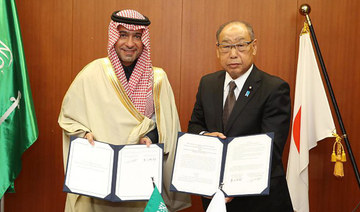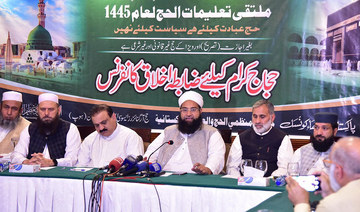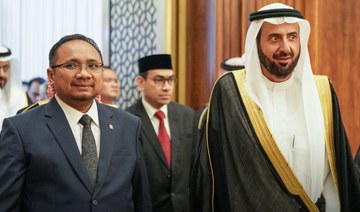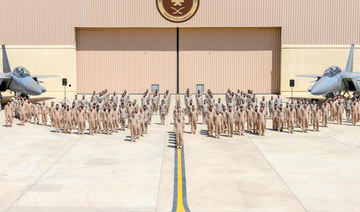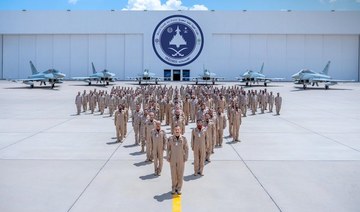KHARTOUM: Saudi Arabia will supply Sudan with millions of tons of oil for the next five years to help it tackle a growing energy crisis, the African country’s oil minister said Monday.
Sudan has been hit with an acute fuel crisis for weeks now, sending black market prices surging in Khartoum as residents queued outside fuel stations for hours.
In a bid to resolve the crisis, a Sudanese delegation led by Oil Minister Abdul Rahman Osman visited Riyadh last week.
“We returned from Saudi Arabia after negotiations with the Saudi side to supply Sudan with oil for five years,” Osman told reporters at the presidential palace in Khartoum.
“Sudan will receive 1.8 million tons of oil in the first year. After that each year the quantity will be raised by seven percent.”
The financing of the deal is to be facilitated by Saudi Development Bank, Osman added without giving financial details of the agreement or when the first oil delivery was expected.
The Sudanese presidency in a separate statement said a draft agreement between the two countries had been prepared.
“The agreement will be signed after the two sides complete the financing procedures of the deal,” it said.
Residents in Khartoum have been queueing for hours outside fuel stations since supplies began dwindling in early April, with officials blaming maintenance delays at a key refinery, although foreign currency shortages have also played a role.
The crisis has since escalated despite official pledges to resolve it.
Most fuel stations were receiving less than their alloted quotas of petrol and diesel, with attendants often keeping the outlets shut once they sold their stock.
Farmers too complained they were unable to transport their products to market as hundreds of trucks had been grounded.
The crisis comes amid surging inflation that has triggered sporadic anti-government protests in Khartoum and other cities.
Sudan’s overall economy has been hit hard, particularly after the south separated from the north in 2011, taking with it about 75 percent of oil revenues.
As the fuel crisis deepened, Sudanese have taken to social media to criticize Saudi Arabia for not helping Khartoum, especially when hundreds of Sudanese soldiers were fighting as part of a Saudi-led coalition against Houthi rebels in Yemen.
In what is seen as a pressure tactic at a time when the Sudanese delegation led by Osman was set to visit Riyadh, Khartoum even said that it was evaluating its troop deployment in conflict-wracked Yemen.
President Omar Al-Bashir deployed troops to Yemen after a major foreign policy shift by Sudan that saw Khartoum break its decades-old ties with Iran and join the Saudi-led coalition.
Saudi to supply oil to fuel-starved Sudan: minister
Saudi to supply oil to fuel-starved Sudan: minister

Beast House sets off on a unique music mission in Saudi Arabia

- Ramadan Alharatani, CEO of MDLBEAST, told Arab News exclusively: “We see Beast House becoming a cornerstone of Riyadh’s music scene”
- The multitiered members-only space provides an immersive experience for music producers, industry experts, creatives, and enthusiasts to connect and learn through its facilities
RIYADH: Only a few months after its recent launch, Beast House has become one of the Saudi music scene’s biggest assets, using MDLBEAST’s comprehensive strategy to enrich the Saudi music industry with solid infrastructure.
Driven by a vision to provide fertile ground in which to cultivate the region’s music culture, Beast House marks MDLBEAST’s debut investment in the music facilities sector in Saudi Arabia with an innovative tripod model that combines music, architecture, and technology to achieve its unique mission in the country.
Ramadan Alharatani, CEO of MDLBEAST, told Arab News exclusively: “We see Beast House becoming a cornerstone of Riyadh’s music scene, a place where creativity is nurtured and talents from the local and international scenes can grow. Our vision is to revolutionize the way music is experienced in the region by fostering connections in the creative community through the power of music.”
The multitiered members-only space provides an immersive experience for music producers, industry experts, creatives, and enthusiasts to connect and learn through its facilities, which provide live music events, workshops, studio spaces, and shared dining spaces.
“Beast House creates a platform for local artists to both showcase and hone their talents. In this space, members can collaborate with other artists through our diverse programming designed to elevate the experience of artists. It’s a welcoming space for anyone still finding their creative path,” Alharatani said.
The studio has two music production rooms with recording booths, a mix room with a Solid State Logic Origin mixing console, and a Neve recording room with a contemporary feel.
Alharatani said: “Beast House studio caters to artists of all levels, with a blend of traditional analog and modern digital equipment. We offer hands-on experience covering the entire production process, from recording to mixing and mastering.
“Our backline includes Fender guitars, Yamaha drums, and world-class microphones like Neumann, Royer, and AKG, alongside high-end outboard gear such as Neve, Bricasti, and UA 1176 compressors. We also provide a comprehensive selection of synths and drum machines from renowned brands like Roland, Moog, and Sequential, along with top-tier software and plugins including Pro Tools, Ableton, and Waves, offering artists endless sonic possibilities.”
The CEO said that these spaces are crucial for a developing music scene and nurturing the industry, and that Beast House is all about engaging the senses in a welcoming environment through its design, curated playlists, refreshments, and dynamic live shows.
He said: “By offering insight into songwriting, production, and the music business, we’re enabling the growth of local talent and opportunities. This fosters job creation, draws in tourism, and stimulates local businesses, which are key components in building a robust music infrastructure.”
But building more venues in the Kingdom is only a part of the MDLBEAST plan.
“Our strategy is built on three pillars — music and artists, live events, and venues — and through these three pillars, we can create a vivid music scene and opportunities for local and global artists to constantly engage with their audience,” Alharatani said. “All this leads to two main goals: support the innovative economy and entertainment tourism in the Kingdom, and guarantee the sustainability of our events.”
Alharatani believes that because this is the first private members’ club of this nature in Saudi Arabia, which may be foreign to some in the region, awareness will be key in getting the public to commit to memberships.
He said: “We’ve been spreading the word, giving people the lowdown on what members’ clubs are really all about. We’ve rolled out a few sneak-peek events to hook them on the experience, and we’re connecting with creative trailblazers to grow the right community. Here, membership is more than a pass — it’s the gateway to a hub where creativity grows and thrives.”
By combining technology, architecture, and music under one roof, Beast House studio’s specialized professional team hopes to use its technical excellence to elevate regional music to new levels.
The recording studio is expecting to become a destination for musicians who want to create memorable music that transcends boundaries and leaves a lasting impact on listeners, Alharatani said.
Housing minister meets with Chinese officials to boost Sino-Saudi cooperation, achieve Vision 2030 targets

- Al-Hogail’s visit also explored the possibility of attracting Chinese companies to the Saudi market
RIYADH: Saudi Arabia’s housing minister has returned from a trip to Beijing where he met with Chinese sector officials to “solidify the partnership between the two nations in construction and real estate development,” the Saudi Press Agency reported on Friday.
Majed Al-Hogail held a meeting with China’s Minister of Housing and Urban-Rural Development Ni Hong and Fang Qiuchen, the president of the China International Contractors Association.
Their discussions focused on developing joint housing policies and programs, exchanging expertise in city planning and sustainable urban development, and exploring investments in construction technology, SPA added.
Al-Hogail’s visit also explored the possibility of attracting Chinese companies specializing in building, construction, maintenance, and cleaning services to the Saudi Arabian market.
During his trip, Al-Hogail signed agreements and memoranda of understanding with major Chinese construction companies.
The Kingdom’s partnership with China to develop its housing sector is part of Saudi Vision 2030’s target of increasing home ownership in Saudi Arabia to 70 percent by improving housing affordability by the end of the decade.
Juniper tree stands tall as a symbol of Al-Baha’s beauty

- Nourished by recent heavy rains in the region, these majestic trees have flourished, forming expansive forests
- The coniferous trees and shrubs can also been found in forested areas of Baljurashi, Beni Hassan, and Al-Mandaq governorates
RIYADH: For centuries, the juniper tree has proudly stood as a symbol of picturesque beauty in Al-Baha region, adorning its slopes and mountain peaks with vibrant green hues.
Nourished by recent heavy rains in the region, these majestic trees have flourished, forming expansive forests that eagerly await the arrival of summer, and the embrace of nature enthusiasts seeking tranquility and solace.
Mohammed bin Saeed Al-Qudwa, a representative of the National Center for Vegetation Development and Combating Desertification in the Al-Baha region, told the Saudi Press Agency that juniper trees make up 30 percent of wild plants in Al-Baha.
The coniferous trees and shrubs can also been found in forested areas of Baljurashi, Beni Hassan, and Al-Mandaq governorates.
Al-Qudwa said that the National Center for Vegetation Development and Combating Desertification, through its forest department in the region, is dedicated to year-round efforts aimed at preserving forests, with a particular emphasis on safeguarding the juniper, Al-Atm, and talh populations.
These endeavors align closely with the strategic objectives outlined in the national action plan for forests in the Kingdom, a crucial component of Saudi Vision 2030.
Al-Qudwa said that security and protection patrols stationed at forest sites throughout the region swiftly intervene to address violations such as unauthorized tree felling or logging.
Patrols can impose penalties in accordance with legal provisions and regulations, ensuring accountability through investigations carried out by inspectors and observers.
Heavy rainfall this year has been beneficial for juniper trees, which have responded with alluring fragrance, interwoven branches, and evergreen foliage.
Junipers are a central feature of the natural forests in the Al-Baha region. Their verdant presence not only enhances the allure of the landscape, but also serves as vital vegetation, safeguarding waterfalls, regulating rainwater runoff, and protecting against erosion.
The majestic trees are also a major attraction for tourists.
More than 30 forests in the Al-Baha region welcomed visitors earlier than usual this year, coinciding with a surge in weekend visitors from within and outside the Kingdom.
Authorities in the region are working tirelessly to prepare the forests, which are complemented by numerous parks, gardens, and traditional villages, for the large number of visitors.
This effort aims to uphold the region’s tourist status by also offering a wide range of activities and services.
Saudi Public Security to issue Makkah entry permit instructions on Saturday ahead of Hajj season

- General Directorate of Passports also said it had begun to issue electronic entry permits for workers in Makkah
RIYADH: Saudi Arabia’s General Directorate of Public Security said on Friday that it would issue instructions for residents wishing to obtain permission to enter Makkah ahead of Hajj season on Saturday, the Saudi Press Agency reported.
It also said any Saudi residents wishing to obtain a permit must do so from the relevant authorities and that those who fail to get the necessary permits will be prevented from entering the holy city.
Also on Friday, in an attempt to streamline entry procedures for residents during the Hajj season, the General Directorate of Passports said it had begun to issue electronic entry permits for workers in Makkah.
The digital service, facilitated through the Ministry of Interior’s online platform Absher and the Muqeem portal, will remove the need for in-person visits to passport offices and will allow those seeking entry permits to submit documents online.
Joint Saudi-US ‘Protection Shield IV’ drill begins

- The drill sought to heighten awareness of chemical, biological, radiological, and nuclear risks
DHAHRAN: In a display of strategic cooperation, the Eastern Region Command in Dhahran orchestrated the latest iteration of the joint Saudi-US exercise, “Protection Shield 4.”
Bringing together branches of the Saudi Armed Forces, the U.S. Central Command (CENTCOM), and a consortium of civilian and military government entities—including the Ministry of Defense’s health services, the General Directorate of Civil Defense, the Ministry of Health, and the Saudi Red Crescent Authority—the drill aimed to bolster preparedness against potential threats of mass destruction.
Colonel Turki bin Salem Al-Sumairi, overseeing the participating mixed battalion, underscored the drill’s dual purpose: to enhance the operational capabilities of all involved and to foster seamless collaboration between Saudi and US forces. Furthermore, the drill sought to heighten awareness of chemical, biological, radiological, and nuclear risks.
Field exercises formed the crux of the event, testing the efficacy of national response plans in confronting scenarios involving weapons of mass destruction. Additionally, coordination and information exchange mechanisms were scrutinized to ensure swift and effective joint responses.
Simulated ammunition was employed during the drills to simulate crisis scenarios arising from the deployment of weapons of mass destruction. Meanwhile, health services units from the Ministry of Defense, the Ministry of Health, the Civil Defense, and the Saudi Red Crescent engaged in drills aimed at enhancing collaborative efforts and refining responses to chemical and biological incidents.







